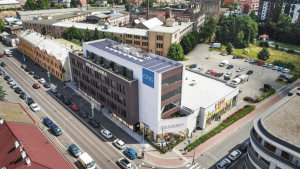
Anna Szymańska, Head of the Office Department at Newmark Polska, summarised how to renegotiate a lease to profit from it throughout its term, what to focus on, what not to miss, how to tackle costs and why it makes sense to engage professional advisers in renegotiations.
Although forecasts for the ongoing inflation crisis remain positive, some companies still feel insecure. Meanwhile, many organisations that contracted space in 2018-2019, the peak years for occupier demand, will see their leases expire soon. This year they will have to decide whether to move to new buildings or to begin renegotiations with their landlords.
Waiting for new office stock
It is not an easy decision to make, especially in Warsaw, where the choice of available office space is limited. New office supply in the capital for the first six months of the year hit 18,700 sqm, the lowest first-half total in more than ten years. As a result, companies seeking large offices to lease in central locations which have recently been the most favoured have a very limited choice. According to analysts from commercial real estate advisory firm Newmark Polska, those willing to consider non-central locations or the Wola district have far more options to choose from - dozens when it comes to offices of up to 500 sqm and even more in the case of offices sized approximately 300 sqm.
“Lease renegotiations in Warsaw are being driven, among other things, by a supply gap. To gain time for thought and to avoid having to move when the choice is limited, some organisations are choosing to renegotiate and to continue in their current locations. Key drivers include changing market conditions and being able to renew a lease for much shorter periods of two or three years. Renegotiations accounted for more than 35 per cent of all leases in the first half of the year and for over 45 per cent in the second quarter”, says Anna Szymańska. “High inflation and market uncertainty are also behind postponing long-term decisions. Due to a rapidly changing market landscape, organisations do not know how they will have to adapt to new situations, how they will fare in a year or two, and what offices they will need then.”
Testing new workplace models
Companies navigating through a post-pandemic world in search of an optimal workplace model also need time for thought. They need to rethink their office functions and the use of in-office, remote and hybrid working.
“As organisations are facing diverse challenges, there is no one-size-fits-all solution. A customised approach and support of professional advisory firms have become more important than ever before. Renegotiations are also an opportunity to negotiate better contractual terms, to improve weaknesses and to secure additional provisions that will deliver meaningful savings during the next lease term”, says Anna Szymańska, whose team at Newmark Polska regularly supports tenants in renegotiations. “A well-drafted lease will also generate meaningful savings on service charges. An attractive rental rate may, however, come with some hidden costs that will be recharged to a tenant in accordance with contractual provisions, subsequently increasing lease liabilities. Our aim is to support our clients in renegotiating leases and we are fully aware of what to check and where to look to prevent such things from happening,” she adds.
With rapidly changing economic conditions and lease payments being where they are, it is difficult to keep a pulse on trends. “That’s what we do - it is our job. We track the real estate market every day, and collect data and information to compare, analyse and draw conclusions. Rapidly changing office fit-out costs are a good example. A tenant who negotiates a lease once every few years is usually unable to track and assess on its own whether proposed fit-out rates are good value for money. It is one of the lease items that the tenant could consult with advisers”, explains Anna Szymańska.
Green provisions in old contracts
The incorporation of green provisions into leases is a new item on the renegotiation agenda. Such measures are taken to ensure sustainable office use in terms of office fit-out, utilization and maintenance. “Complying with carbon reporting legislation, global organisations want offices to be aligned with their environmental goals - this is also where we support our clients. At the outset of a relocation process, we present a list of buildings meeting a tenant’s environmental requirements or planning to have photovoltaic panels mounted or other green energy sources secured in the near future. It is also the adviser’s responsibility to ensure that green provisions come at no additional cost to a client’s organisation, such as sharing solar panel installation costs or the costs of installing electricity and water submeters in older buildings”, concludes Anna Szymańska.



